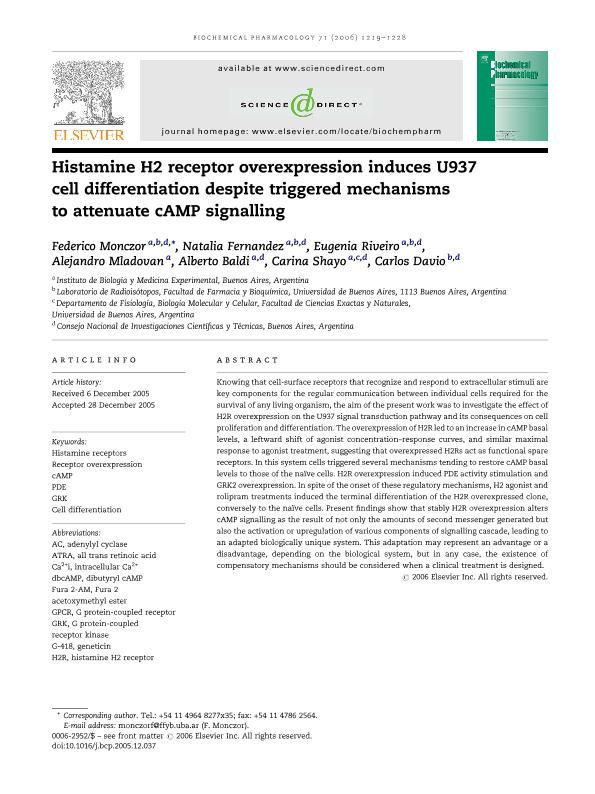Artículo
Histamine H2 overexpression induces U937 cell differentiation despite triggered mechanisms to attenuate cAMP signalling
Monczor, Federico ; Fernández, Natalia Brenda
; Fernández, Natalia Brenda ; Riveiro, Maria Eugenia
; Riveiro, Maria Eugenia ; Mladovan, Alejandro; Baldi, Alberto
; Mladovan, Alejandro; Baldi, Alberto ; Shayo, Carina Claudia
; Shayo, Carina Claudia ; Davio, Carlos Alberto
; Davio, Carlos Alberto
 ; Fernández, Natalia Brenda
; Fernández, Natalia Brenda ; Riveiro, Maria Eugenia
; Riveiro, Maria Eugenia ; Mladovan, Alejandro; Baldi, Alberto
; Mladovan, Alejandro; Baldi, Alberto ; Shayo, Carina Claudia
; Shayo, Carina Claudia ; Davio, Carlos Alberto
; Davio, Carlos Alberto
Fecha de publicación:
04/2006
Editorial:
Elsevier
Revista:
Biochemical Pharmacology
ISSN:
0006-2952
e-ISSN:
1873-2968
Idioma:
Inglés
Tipo de recurso:
Artículo publicado
Clasificación temática:
Resumen
Knowing that cell-surface receptors that recognize and respond to extracellular stimuli are key components for the regular communication between individual cells required for the survival of any living organism, the aim of the present work was to investigate the effect of H2R overexpression on the U937 signal transduction pathway and its consequences on cell proliferation and differentiation. The overexpression of H2R led to an increase in cAMP basal levels, a leftward shift of agonist concentration–response curves, and similar maximal response to agonist treatment, suggesting that overexpressed H2Rs act as functional spare receptors. In this system cells triggered several mechanisms tending to restore cAMP basal levels to those of the naïve cells. H2R overexpression induced PDE activity stimulation and GRK2 overexpression. In spite of the onset of these regulatory mechanisms, H2 agonist and rolipram treatments induced the terminal differentiation of the H2R overexpressed clone, conversely to the naïve cells. Present findings show that stably H2R overexpression alters cAMP signalling as the result of not only the amounts of second messenger generated but also the activation or upregulation of various components of signalling cascade, leading to an adapted biologically unique system. This adaptation may represent an advantage or a disadvantage, depending on the biological system, but in any case, the existence of compensatory mechanisms should be considered when a clinical treatment is designed.
Palabras clave:
Histamine Receptors
,
Receptor Overexpression
,
Cell Differentiation
,
Grk
Archivos asociados
Licencia
Identificadores
Colecciones
Articulos(IBYME)
Articulos de INST.DE BIOLOGIA Y MEDICINA EXPERIMENTAL (I)
Articulos de INST.DE BIOLOGIA Y MEDICINA EXPERIMENTAL (I)
Citación
Monczor, Federico; Fernández, Natalia Brenda; Riveiro, Maria Eugenia; Mladovan, Alejandro; Baldi, Alberto; et al.; Histamine H2 overexpression induces U937 cell differentiation despite triggered mechanisms to attenuate cAMP signalling; Elsevier; Biochemical Pharmacology; 71; 8; 4-2006; 1219-1228
Compartir
Altmétricas



